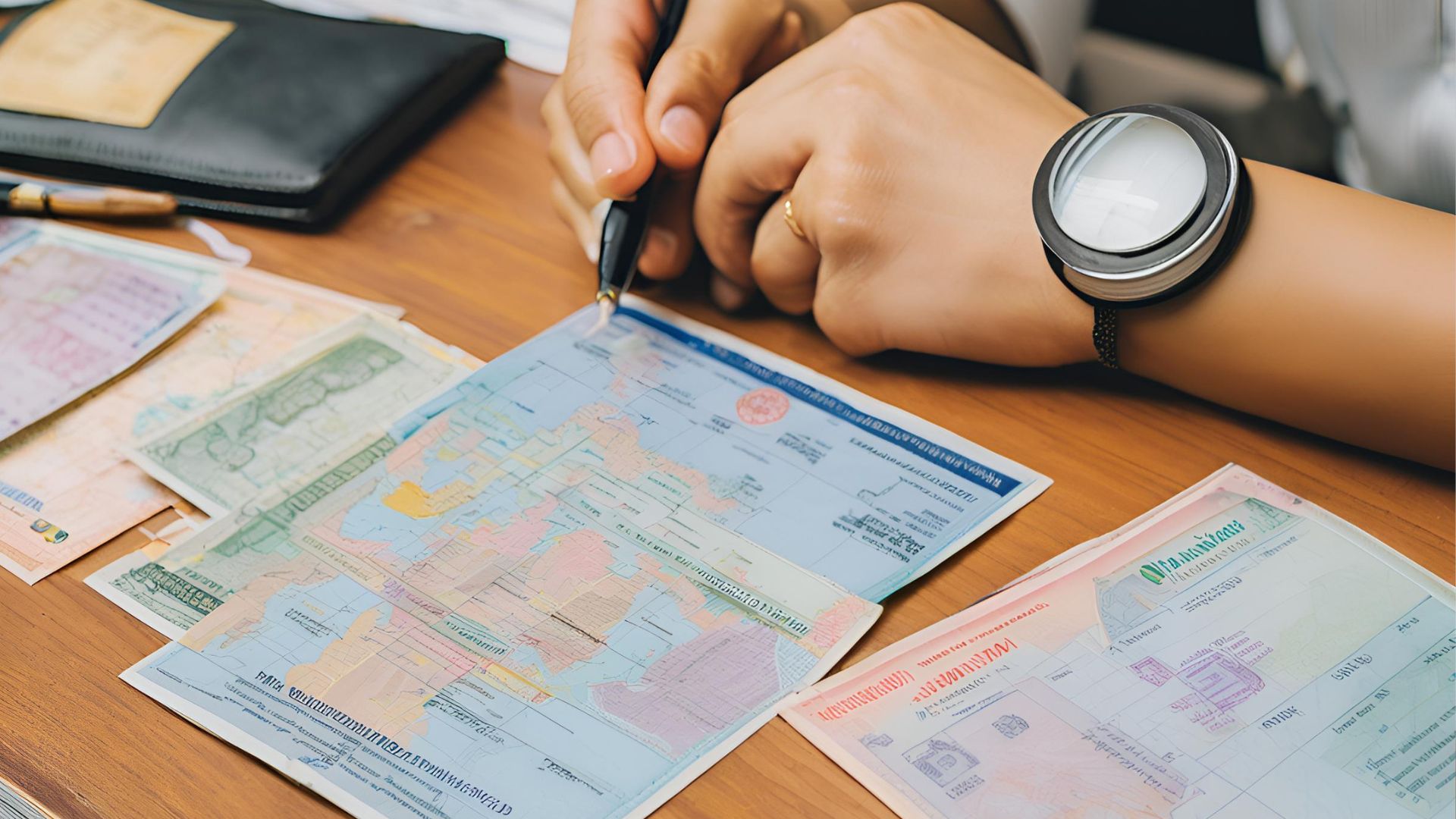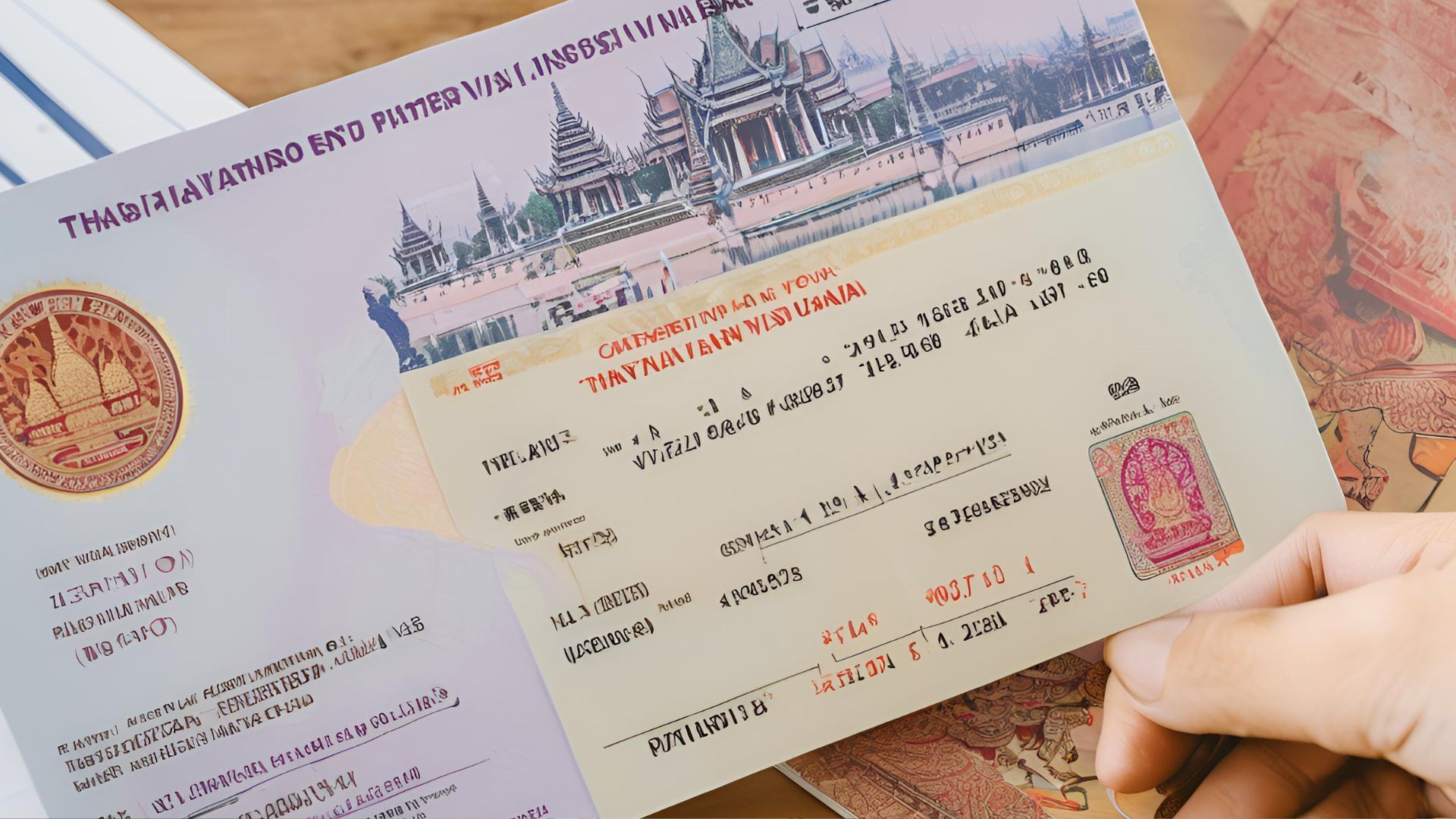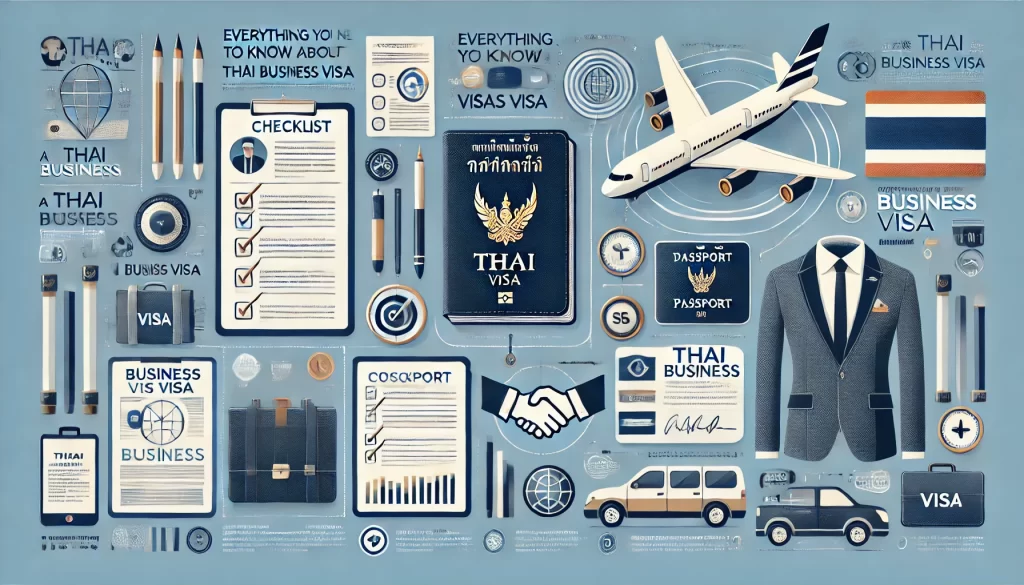Are you dreaming of starting a business in Thailand? 🇹🇭 The Land of Smiles offers incredible opportunities for entrepreneurs, but navigating the visa process can be a daunting task. Many aspiring business owners find themselves lost in a maze of confusing requirements and bureaucratic red tape.
Don’t let visa complications derail your Thai business dreams! Whether you’re launching a startup, expanding your existing company, or seeking new investment opportunities, understanding the ins and outs of Thai business visas is crucial. In this comprehensive guide, we’ll walk you through everything you need to know about applying for a Thai Business Visa, from preparation to approval.
Ready to unlock the secrets of a successful Thai Business Visa application? Let’s dive into the essential steps, including understanding visa types, preparing your documents, navigating the application process, meeting business requirements, extending your stay, and insider tips for success. With our expert advice, you’ll be well-equipped to turn your Thai business aspirations into reality.
Understanding Thai Business Visas

A. Types of Thai business visas
There are primarily three types of Thai business visas:
- Non-Immigrant B Visa
- Board of Investment (BOI) Visa
- SMART Visa
| Visa Type | Purpose | Duration |
|---|---|---|
| Non-Immigrant B | General business activities | Up to 90 days |
| BOI | For companies promoted by BOI | Up to 2 years |
| SMART | For highly skilled professionals | Up to 4 years |
B. Eligibility criteria
To be eligible for a Thai business visa, applicants must meet the following requirements:
- Have a legitimate business reason for entering Thailand
- Possess a valid passport with at least 6 months validity
- Provide proof of sufficient funds
- Have a clean criminal record
- Meet specific criteria for the chosen visa type
C. Duration and validity
The duration and validity of Thai business visas vary:
- Non-Immigrant B Visa: Initially valid for 90 days, extendable up to 1 year
- BOI Visa: Valid for up to 2 years, renewable
- SMART Visa: Valid for up to 4 years, renewable
D. Benefits of having a Thai business visa
Holding a Thai business visa offers several advantages:
- Legal right to conduct business activities in Thailand
- Ability to open a Thai bank account
- Opportunity to apply for a work permit
- Access to long-term stay options
- Possibility of bringing family members under certain conditions
With these benefits, a Thai business visa provides a solid foundation for entrepreneurs and professionals looking to establish or expand their business presence in Thailand. Next, we’ll explore the essential steps in preparing your application to ensure a smooth process.
Preparing Your Application

A. Required documents
To prepare your Thai Business Visa application, you’ll need to gather several essential documents. Here’s a comprehensive list:
- Valid passport (with at least 6 months validity)
- Completed visa application form
- Recent passport-sized photographs
- Letter of invitation from a Thai company
- Business registration documents
- Financial statements
- Work permit (if applicable)
- Proof of accommodation in Thailand
B. Financial requirements
Meeting the financial criteria is crucial for your Thai Business Visa application. Here’s a breakdown of the key requirements:
| Requirement | Details |
|---|---|
| Minimum capital | 2 million Thai Baht for most businesses |
| Proof of funds | Bank statements or financial reports |
| Investment evidence | Documentation of capital transfer to Thailand |
C. Company registration process
Before applying for a Thai Business Visa, ensure your company is properly registered:
- Choose a company name and structure
- File memorandum of association
- Hold statutory meeting
- Register the company with the Department of Business Development
- Obtain tax ID from the Revenue Department
D. Proof of business activities
Demonstrating genuine business operations is essential. Provide evidence such as:
- Contracts with clients or suppliers
- Office lease agreement
- Employee records and payroll information
- Marketing materials or business plans
- Recent invoices or purchase orders
E. Passport and photo specifications
Ensure your passport and photos meet the following requirements:
- Passport validity: At least 6 months beyond your intended stay
- Photo size: 4cm x 6cm
- Background: White or light color
- Expression: Neutral, facing forward
- Accessories: None (except for religious headwear)
With these documents and requirements in order, you’ll be well-prepared for the next step in the Thai Business Visa application process. Next, we’ll explore how to navigate the application process itself.
Navigating the Application Process

A. Where to apply
When applying for a Thai Business Visa, you have several options for submitting your application. The most common places to apply include:
- Thai embassies or consulates in your home country
- Thai immigration offices within Thailand
- Authorized visa application centers in select countries
It’s important to note that the specific requirements and procedures may vary depending on where you apply. Always check the official website of the Thai embassy or consulate in your country for the most up-to-date information.
B. Online vs. in-person applications
| Application Method | Pros | Cons |
|---|---|---|
| Online | Convenient, time-saving | Limited availability, potential technical issues |
| In-person | Direct communication, immediate clarification | Time-consuming, travel may be required |
While online applications are becoming more common, not all locations offer this option. In-person applications are still widely accepted and may be preferred for complex cases or when additional documentation is required.
C. Application fees
Application fees for a Thai Business Visa can vary depending on the type of visa and the duration of stay. Here’s a general breakdown of fees:
- Single-entry visa: Approximately 2,000 THB
- Multiple-entry visa: Approximately 5,000 THB
Keep in mind that these fees are subject to change and may differ based on your country of application. Always verify the current fees with the Thai embassy or consulate where you’re applying.
D. Processing times
Processing times for Thai Business Visa applications typically range from:
- 3-5 working days for standard applications
- 1-2 working days for express service (if available, additional fees may apply)
Factors that can affect processing times include:
- Completeness of your application
- Current workload of the embassy or consulate
- Any additional verification required
To ensure a smooth process, submit your application well in advance of your intended travel date. With your visa in hand, you’ll be ready to explore the business opportunities Thailand has to offer. Next, we’ll delve into the specific business requirements you’ll need to meet to maintain your visa status.
Meeting Business Requirements

A. Minimum capital investment
To obtain a Thai Business Visa, foreign entrepreneurs must meet specific capital investment requirements. The minimum registered capital for a foreign-owned company in Thailand is typically 2 million baht (approximately $60,000 USD). However, this amount can vary depending on the nature of the business and the number of foreign work permits required.
| Business Type | Minimum Capital Requirement |
|---|---|
| General business | 2 million baht per foreign worker |
| Export-oriented | 1 million baht per foreign worker |
| BOI-promoted | Varies based on promotion category |
B. Employee quota for foreign workers
Thailand imposes strict regulations on the ratio of Thai to foreign employees in a company. The general rule is:
- 4 Thai employees for every 1 foreign worker
- Minimum of 2 million baht in paid-up capital for each foreign worker
This quota ensures job opportunities for Thai nationals while allowing businesses to bring in necessary foreign expertise.
C. Work permit regulations
Foreign business visa holders must obtain a work permit to legally work in Thailand. Key work permit requirements include:
- Valid non-immigrant B visa
- Job offer from a Thai company
- Proof of qualifications and experience
- Health certificate
- Police clearance from home country
Work permits are typically issued for one year and must be renewed annually.
D. Tax obligations
Businesses operating in Thailand have several tax obligations:
- Corporate Income Tax: 20% on net profits
- Value Added Tax (VAT): 7% on goods and services
- Withholding Tax: Varies based on transaction type
- Social Security Contributions: 5% of employee’s salary (capped)
Proper tax compliance is crucial for maintaining your business visa status and avoiding penalties.
Now that we’ve covered the key business requirements, let’s explore how to extend your Thai Business Visa once you’ve established your operations.
Extending Your Thai Business Visa

Renewal process
The renewal process for a Thai Business Visa requires careful planning and timely action. Typically, you should begin the renewal process at least 30 days before your current visa expires. Here’s a step-by-step guide:
- Gather required documents
- Submit application to the Immigration Bureau
- Attend an interview (if required)
- Pay the renewal fee
- Receive your visa extension
Required documents for extension
To extend your Thai Business Visa, you’ll need to provide:
- Completed TM.7 form
- Valid passport with at least 6 months validity
- Recent passport-sized photographs
- Proof of address in Thailand
- Updated business documents
| Document Type | Purpose |
|---|---|
| TM.7 form | Official application for extension |
| Passport | Verify identity and current visa status |
| Photographs | For updated visa |
| Address proof | Confirm residency in Thailand |
| Business docs | Demonstrate ongoing business activities |
Timeframes and deadlines
It’s crucial to adhere to the following timeframes:
- Begin renewal process: 30 days before expiration
- Submit application: At least 7 working days before expiration
- Processing time: Usually 5-7 working days
Common reasons for denial
Applications may be denied due to:
- Incomplete or inaccurate documentation
- Failure to meet business requirements
- Overstaying previous visa
- Criminal record or security concerns
To avoid these issues, double-check all documents and ensure full compliance with Thai business regulations. With proper preparation and timely submission, you can successfully extend your Thai Business Visa and continue your business operations in Thailand.
Tips for a Successful Application

Working with a local lawyer
Collaborating with a local Thai lawyer can significantly improve your chances of a successful business visa application. These professionals possess in-depth knowledge of Thai immigration laws and can guide you through the complex process. Here’s why working with a local lawyer is beneficial:
- Expertise in Thai legal system
- Up-to-date knowledge of visa regulations
- Assistance with document preparation
- Representation during official meetings
| Benefits of a Local Lawyer | DIY Approach |
|---|---|
| Reduced risk of errors | Higher risk of mistakes |
| Time-saving | Time-consuming |
| Professional guidance | Self-research required |
| Local connections | Limited network |
Avoiding common mistakes
To ensure a smooth application process, be aware of these frequent pitfalls:
- Incomplete documentation
- Inaccurate financial statements
- Misunderstanding work permit requirements
- Overlooking visa extension deadlines
Staying updated on policy changes
Thai visa regulations can change rapidly. Stay informed by:
- Following official government websites
- Subscribing to expat forums and newsletters
- Maintaining contact with your local lawyer or visa agent
- Joining business associations in Thailand
Networking with other business visa holders
Building connections with fellow business visa holders can provide valuable insights and support. Consider:
- Joining expat business groups
- Attending networking events
- Participating in online forums and social media groups
- Sharing experiences and learning from others’ challenges
By implementing these tips, you’ll be better prepared to navigate the Thai business visa application process successfully. Remember, thorough preparation and staying informed are key to achieving your goal of conducting business in Thailand.
Applying for a Thai Business Visa can be a complex process, but with the right preparation and understanding, it becomes much more manageable. From gathering the necessary documents to meeting specific business requirements, each step plays a crucial role in securing your visa. Remember to pay attention to details, such as meeting financial criteria and providing accurate information about your business activities in Thailand.
As you embark on this journey, stay informed about the latest visa regulations and seek professional advice if needed. By following the outlined steps and tips, you’ll be well-equipped to navigate the application process successfully. Whether you’re starting a new venture or expanding your business in Thailand, a properly obtained business visa will pave the way for your professional endeavors in this vibrant Southeast Asian nation.

